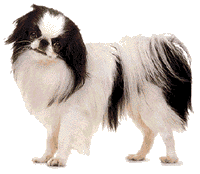Japanese Chin Rescue
Profile
By Carole Cuzzort Allan
The Japanese Chin dog is still reasonably
unknown in America, and that's the way that JCCARE, the Japanese
Chin Care and Rescue Effort, would like it to remain. Last year,
the rescue numbers grew again to over 150 dogs turned into rescue
or picked up from humane societies and animal shelters. While
these numbers are not as extreme as some of the better-known
breeds, the club officers are seeing a steady rise in rescue
demands. The club has representatives stationed all over the
United States and across the border into Canada prepared to
rise and meet the challenge.
The organization sponsors, rehabilitates
and re-homes Japanese Chins from all parts of the country. Each
dog taken into care by representatives of the organization is
fostered in a home situation where the real work begins. Veterinarians
across the country are chosen for their expertise in small-breed
care and are called on to evaluate and treat each rescue. The
dogs are taken in for a physical and are spayed or neutered
prior to placement. Chins are prone to heart and lung problems
as well as teeth decay, so each dog is carefully checked, placed
on heartworm medication and provided with any health care that
the consulting veterinarian recommends.
Dogs coming into rescue seldom arrive
without emotional baggage as well as possible health problems.
These little animals, bred for centuries to be companions to
man, have often been physically and emotionally abused; some
are older, many are physically challenged, but none are turned
away. Dogs have been taken in from abusive situations, from
broken homes and as strays on the street. Occasionally, a dog
is turned in by elderly owners no longer able to care for it,
or by relatives. Many of those animals, now situated in permanent
homes, are involved in activities including agility, obedience,
therapy and tracking.
Not all rescue animals, Japanese Chins
included, are success stories. Many are too sick emotionally
or physically to lead normal lives after rescue. A few don't
make it into new homes, but even these are accepted by club
members and placed in special circumstance or "end-of-the-road
homes" within the group.
The Japanese Chin Care and Rescue Effort
was originally formed within the Japanese Chin Club of America
but has since received tax recognition and operates independently
of the parent breed club. Members keep in touch via the Internet
and the club sponsors a web page, www.japanesechinrescue.org,
that includes breed information, available dogs, success stories
from past adoptions and links to fund-raising sites.
Foster families as well as adoptive families
fill out an extensive questionnaire, and are assigned a representative
to perform an interview and a home-check before being approved
as parents for a rescue. Applicants must understand the breed
requirements and be prepared to provide a safe, secure environment
for the dogs. Applicants must also be prepared to love and cherish
each tiny canine body before they are entrusted with one of
the needy animals.
JCCARE is fighting the battle against
homeless Chins the best way that it knows how, by taking one
dog at a time and giving it back a life to enjoy.

